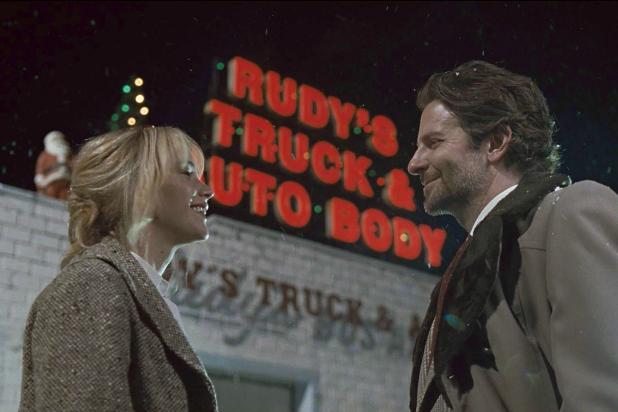DECEMBER 29, 2015
In his last three films (“The Fighter,” “Silver Linings Playbook” and “American Hustle”), director David O. Russell has served as the ringmaster of a high-wire act of films that thrillingly threatened at times to topple, balancing themes of individuality, real-life stories, dysfunctional families and just a little bit of fantasy. And in each case, Russell has brought these films safely to the other side, reaping acclaim, big box-office and multiple award nominations.
In his latest film “Joy,” however, the wire has finally snapped.
Not that all of these Russell themes aren’t here. “Joy” is based on the real-life story of Joy Mangano, a housewife who invented the Miracle Mop and by so doing reinvented herself as a home-shopping superstar on QVC. Prior to that, however, she had been the sole support of a family of emotional leeches, whose selfish neediness threaten to dash the dreams of her grandmother Mimi (Diane Ladd, the film’s narrator) that Joy would do something great in her life And fantasy? There’s Joy’s mother Terry (Virginia Madsen) who has taken to her bed, hopelessly hooked on a Susan Lucci soap opera that conveniently echoes the themes of female strength with which Joy is currently struggling.
All these Russell themes have worked before. Plus there are Russell returnees Jennifer Lawrence, Robert DeNiro and Bradley Cooper. What’s not to love?
Turns out, quite a bit.
From what I have read of the real Joy Mangano’s life, what she lived through had the makings of a solid fiction film or even a documentary — the events in her life were interesting enough to carry either. How Russell has decided to depict her life…well, it’s strange. The very long Act 1 seems to be Russell’s demented tribute to Kaufman & Hart’s play “You Can’t Take It With You,” in which, under one roof, lives a group of lovable eccentrics whose quirks keep the family together. In “Joy,” those quirks seem determined to tear the family apart.
Terry, bed-bound entirely by choice, treats Joy (Lawrence) as a servant, and Joy’s bitter half-sister Peggy (Elizabeth Röhm) sees her as someone she must constantly undermine in order to bolster her own low self-esteem. And then there’s the men. As Joy is running late for work, suddenly her philandering father Rudy (DeNiro) is dumped onto her doorstep by his latest squeeze who wants nothing more to do with him. Joy can only offer him shelter in a basement shared with her ex-husband Tony (Edgar Ramirez), an aspiring Venezuelan lounge singer, who’s still living in the house. All this time, Joy is trying to shield her two children from the turmoil in the house, which often results in Joy’s exhaustion and tears.
Rudy soon begins dating wealthy Italian widow Trudy (a wonderful Isabella Rossellini), who invites his family onto her yacht, where an accident involving red wine and broken glass causes Joy, ever-the-servant, to cut her hand while mopping it up. This gives Joy the idea to create a mop that wrings itself out without touching it. Her first attempts to sell her mop are disastrous, until her ex Tony (suddenly responsible) arranges a meeting for her at a new home-shopping channel, QVC.
The QVC section is where “Joy” unexpectedly takes off and begins to get the same rhythms that made “Silver Linings” so memorable. She meets QVC exec Neil Walker (Cooper), who initially dismisses Joy’s “Miracle Mop” but becomes convinced when Joy herself demonstrates the product and the passion behind it. Based on Neil’s assurances, Joy (and especially Trudy) extend themselves financially to produce enough mops, but when an incompetent QVC host can’t work the mop, the network moves on. Facing bankruptcy, Joy stands her ground with Neil and insists on another chance as herself as pitchman. Neil acquiesces, and Joy faces a TV camera for the first time in her life. And she’s on in 5…4…3…2..1. The result is the most suspenseful and memorable scene in the film.
Act 3 is kind of a shambles, as Joy’s success causes the leeches to return, and she must fight forces beyond her control. Yet when she is most down and out, she disappears and shows up in Texas, where a deus ex machina arrives (we are told this but never shown this) out of the blue.
Huh?
The only saving grace here is Jennifer Lawrence, and she is a major saving grace. As, along with Clooney, probably the most likable movie star out there, she brings a lot of positive baggage to “Joy,” and she uses it. She carries this whole enterprise on her back, and her enormous talent almost carries it across the finish line. Cooper is terrific as the QVC guide — not a huge part but one that he really socks home. DeNiro can do cranky dad in his sleep and does. Ladd’s nurturing part as written is unfortunately one-note, and Madsen, such a good actress, is stuck in a bed throughout. As the ex, Ramirez is initially fun, singing and dancing, but his character soon retreats into wallpaper — too bad. But there’s a wonderful cameo of QVC superstar Joan Rivers (played well by her daughter Melissa) who tells Neil to put this Joy in a dress.
As admirable as Joy Magnano’s struggle was, David O. Russell has turned it into a story about his own issues and unfortunately lessened it as a result.
GRADE: C












